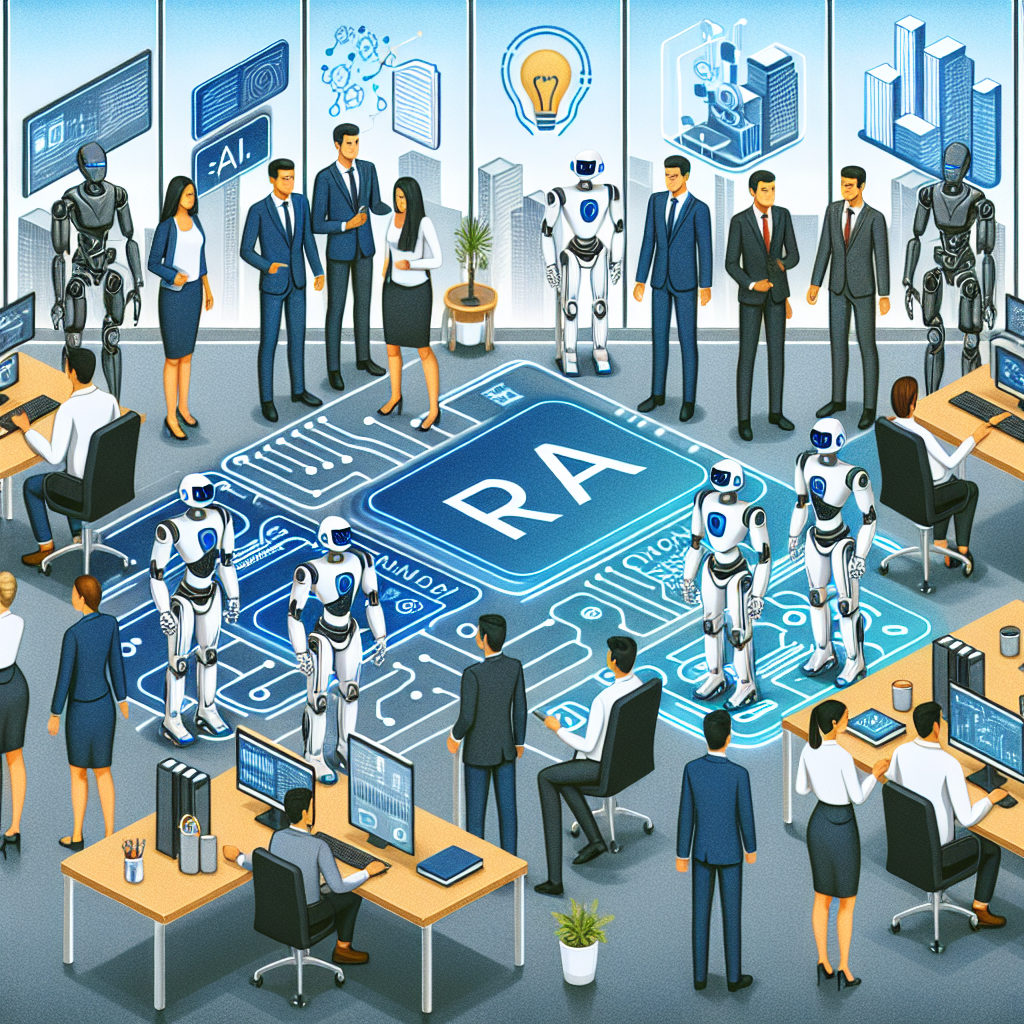Imagine you run a busy office where your team is overwhelmed with repetitive tasks like data entry, invoice processing, and scheduling meetings. What if I told you that you could automate those mundane chores and free up your employees to focus on more creative and strategic work? Thats where RPA – or Robotic Process Automation – comes in! ⭐
Understanding RPA: The Basics
So, what is RPA in simple terms? RPA uses software robots, or "bots," to mimic human actions within digital systems. These bots can log into applications, enter data, and perform calculations just like a human would, but much faster and without getting tired. Imagine a virtual assistant that tirelessly works 24/7 without taking breaks! With RPA consulting services, companies can refine this automation to fit their needs and achieve greater efficiency.
Let’s look at some real-life scenarios where RPA can make a big difference:
- ⭐ Data Management: A finance department could use RPA to automate the reconciliation of bank statements. Instead of manually comparing entries, the bot does it in seconds, reducing errors and saving time.
- ⭐ Customer Service: Companies can deploy RPA bots to handle common customer inquiries through emails and chat, providing immediate responses and keeping customer satisfaction high.
- ⭐️ Invoicing: Automating invoicing through RPA ensures that every invoice is generated correctly and sent out on time, reducing overdue payments and improving cash flow.
Statistics show that businesses implementing RPA can expect to see productivity increases of about 30% to 50%, which is a game changer in today’s competitive market. ⭐
Benefits of RPA: Why Is It Important?
Besides saving time, RPA offers numerous benefits that can redefine your organizations operational landscape:
- ⭐ Cost Efficiency: By reducing the time spent on mundane tasks, RPA can save your business significant operational costs.
- ⭐ Accuracy: Bots eliminate human errors, ensuring high-quality output—great for settings where precision is key!
- ⭐ Scalability: RPA allows for quick adjustments to workloads. If your business experiences a sudden growth spurt, adding more bots can help manage increased demand without hiring additional staff.
With over 20 years of experience, our team at webmaster.md is dedicated to offering comprehensive RPA design and deployment services, ensuring you maximize these benefits right from implementation.
Let’s share an inspiring story. A local retail company we worked with faced delays in processing online orders, leading to unhappy customers. They approached us to explore RPA. We implemented RPA systems that automatically processed orders, managed inventory, and synced between different platforms.
Within weeks, they reported a 40% reduction in processing time! Happy customers led to increased sales, allowing the business to expand its product range. Their feedback? They wouldnt have been able to achieve such results without our RPA solutions! ⭐
Thinking of diving into RPA? Here are some expert tips:
- ✔️ Start Small: Begin with simple tasks and gradually implement RPA into more complex processes.
- ✔️ Involve Stakeholders: Get input from your team early. They will have insights that could make the implementation smoother.
- ✔️ Continuously Monitor: After deployment, keep an eye on the bots. Frequent assessments can help ensure everything runs smoothly.
Call to Action
Are you ready to take the plunge into automation? ⭐ Let our skilled professionals at webmaster.md guide you through your RPA journey. With personalized RPA consulting services and a commitment to excellence, we ensure you’re not just keeping up but leading in your industry. Contact us today at +373 601 066 66 or visit our website at webmaster.md. Lets transform your business operations together!
Frequently Asked Questions:
- What is RPA? RPA stands for Robotic Process Automation, which automates repetitive tasks using software bots.
- What are the main benefits of RPA? RPA increases efficiency, accuracy, and scalability while reducing costs.
- How can RPA be implemented in my business? Begin with small processes, consult with experts, and gradually expand its use.
- Is RPA the same as artificial intelligence? No, RPA automates predefined tasks, while AI can learn and adapt.
- Can RPA work with my existing software? Yes, RPA can integrate with most software systems without the need for extensive updates.
- How long does it take to implement RPA? Implementation time varies based on project complexity but often takes a few weeks to a few months.
- What industries benefit from RPA? Almost every industry stands to benefit, including healthcare, finance, and manufacturing.
- Do I need special training to use RPA? Generally, no. RPA tools are user-friendly, but some training may enhance team proficiency.
- How do I know if RPA is right for my business? Evaluate repetitive tasks and processes. If they consume significant time, RPA can be beneficial.
- Can webmaster.md help with RPA implementation? Absolutely! Our experienced team provides tailored RPA solutions to fit your business needs.
| Task | Time Saved with RPA | Error Reduction Rate |
| Invoice Processing | 30 mins per invoice | 90% |
| Data Entry | 50% reduction | 98% |
| Order Management | 40% faster | 95% |
| Customer Queries | 70% response rate within 1 min | 98% |
| Report Generation | 80% faster | 99% |
| Database Updates | 60% time savings | 97% |
| Compliance Checks | 50% time savings | 99% |
| Scheduling | 40% more efficient | 96% |
| Inventory Management | 30% faster audits | 97% |
| Employee Onboarding | 50% reduction in time | 95% |
Why is RPA Important? Discover the Key Benefits for Modern Organizations
In today’s rapidly evolving digital landscape, businesses are constantly on the lookout for ways to optimize their operations. One technology that has captured the attention of modern organizations is RPA, or Robotic Process Automation. But why is RPA important? ⭐ The truth is, RPA is not just a trend—its a transformative solution designed to streamline business processes and boost efficiency.
The Game-Changing Impact of RPA
Organizations across various sectors are diving into RPA not just for its novelty but for its profound impact. Here are several key benefits of embracing RPA:
- ⭐ Enhanced Productivity: By automating repetitive tasks, RPA allows employees to focus on high-value work rather than mundane chores. For instance, if your team spends hours entering data manually, deploying RPA can cut that time significantly. Studies show that businesses can see productivity increases of over 30%!
- ⭐ Cost Reduction: Imagine saving thousands of euros annually by automating processes like invoicing and report generation. With RPA implementation, companies have reduced operational costs by up to 40%, freeing up funds for innovation and growth.
- ⭐ Improved Accuracy and Compliance: Humans are prone to errors, especially during repetitive tasks. RPA bots execute tasks with remarkable accuracy, reducing errors to a fraction. This precision is especially beneficial for industries where compliance is crucial, such as finance and healthcare.
Real-Life Transformations through RPA
Let’s delve into a couple of examples that illustrate how RPA is enabling companies to operate more efficiently:
- ⭐ A telecommunications company faced challenges in processing large volumes of customer orders. By integrating RPA, they automated order fulfillment and significantly reduced the time taken to respond to customer requests. This not only boosted customer satisfaction but also improved the overall service quality.
- ⭐ A retail giant struggled with inventory management. They implemented an RPA solution to track stock levels and manage reordering processes automatically. As a result, they avoided stockouts and excess inventory, leading to better cash flow management and enhanced sales opportunities.
The Scalability Factor
Scalability is another crucial benefit of RPA. With business growth comes increased workloads. RPA empowers organizations to seamlessly scale operations without the need to hire additional staff. Whether you’re a small startup or a large enterprise, RPA can adapt to your needs:
- ⭐ As you launch new products or services, RPA bots can handle additional tasks effortlessly.
- ⭐ During seasonal fluctuations, RPA allows you to scale down operations quickly without compromising efficiency.
Beyond operational benefits, RPA also greatly affects employee morale. When employees are relieved from tedious tasks, they can concentrate on meaningful projects that enhance their skills and creativity. This leads to a more engaged workforce, which is vital for any organization’s long-term success:
- ✨ Employees are more likely to feel valued when they focus on innovative projects rather than repetitive tasks.
- ⭐ Organizations report higher retention rates as a result of job satisfaction spurred by RPA technology.
Call to Action: Start Your RPA Journey
Are you ready to revolutionize your business operations? With over 20 years of experience, our team at webmaster.md specializes in providing comprehensive RPA design and deployment services tailored to your needs. ⭐ Don’t get left behind; contact us at +373 601 066 66 or visit our website at webmaster.md. Let’s embark on your automation journey together!
Frequently Asked Questions:
- What are the primary benefits of RPA? RPA enhances productivity, reduces costs, and improves accuracy and compliance.
- How does RPA improve employee satisfaction? Employees can focus on more meaningful tasks, leading to higher job satisfaction.
- Can RPA be implemented in any industry? Yes! RPA is adaptable and can benefit various sectors, including finance, healthcare, and retail.
- How quickly can I see results from RPA? Most organizations experience noticeable improvements within weeks of implementation.
- What types of tasks are best suited for RPA? Repetitive, rule-based tasks are ideal, such as data entry, processing transactions, and managing customer queries.
- Do I need a technical background to use RPA? No, many RPA tools are designed to be user-friendly, requiring minimal technical knowledge.
- What’s the typical ROI for RPA investments? Companies often see a return on investment within the first year, with a substantial reduction in operational costs.
- Can RPA work alongside my existing IT systems? Yes, RPA can integrate with most existing software setups without significant changes.
- Is RPA the future of automation? Yes, as technology advances, RPA will continue to shape how businesses operate, making it a vital investment.
- How can webmaster.md assist with RPA? We provide tailored RPA solutions, ensuring seamless integration and maximum benefits for your business.
Where is RPA Used? Real-World Examples of Successful RPA Implementation
As Robotic Process Automation (RPA) has gained traction, organizations across various industries have embraced this technology to drive efficiency and productivity. But where exactly is RPA used, and how has it made a difference? ⭐ Let’s dive into some compelling real-world examples that showcase successful RPA implementations!
1. Banking and Finance
The finance sector is one of the earliest adopters of RPA, leveraging its capabilities to enhance operations, improve compliance, and reduce risk:
- ⭐ A major bank implemented RPA to automate the processing of loan applications. Traditionally, this process involved significant manual input, leading to delays. By employing RPA bots, the bank reduced processing time by over 60%. They not only expedited approvals but also enhanced the accuracy of data input, reducing the error rate to nearly zero.
- ⭐ Another financial institution utilized RPA to perform reconciliations and compliance checks. The bots managed thousands of transactions daily, ensuring that all regulatory requirements were met promptly without the risk of human error. As a result, the bank could minimize compliance costs and avoid hefty fines.
2. Retail and E-commerce
The retail sector has also seen significant benefits from RPA, particularly in managing inventories and enhancing customer experience:
- ⭐ An e-commerce giant implemented RPA for order management. The bots took charge of tracking orders, processing returns, and managing customer inquiries, significantly decreasing resolution times. The company reported an increase in customer satisfaction ratings, thanks to faster service.
- ⭐ A brick-and-mortar retailer adopted RPA to streamline inventory management. With bots tracking stock levels and automating replenishment orders, the retailer minimized stockouts and optimized inventory levels. This level of efficiency not only prevented lost sales but also improved cash flow management.
3. Healthcare
The healthcare industry is rapidly adopting RPA to enhance patient care and streamline administrative tasks:
- ⭐ A large hospital used RPA to automate patient registration and billing processes. This initiative allowed record-keeping staff to focus on direct patient care while reducing administrative overhead. They reported a decrease of over 30% in patient registration time, enhancing the overall patient experience.
- ⭐ A healthcare insurance provider deployed RPA for claims processing. By automating data entry and validation, the company reduced turnaround time for claims by 50%, improving customer satisfaction and operational efficiency.
4. Telecommunications
Telecom companies have turned to RPA to manage vast volumes of customer data and service requests:
- ⭐ A telecommunications provider leveraged RPA to automate service requests and troubleshoot requests. The bots quickly processed customer requests and automatically generated tickets for service issues. This cut down response times and improved service delivery by 40%.
- ⭐ Another player in the telecom sector utilized RPA for reporting and analytics. By automating the extraction and manipulation of data, they reduced the time taken for reports by nearly 70%, allowing managers to focus on data-driven decision-making.
5. Human Resources
Many organizations are deploying RPA in their HR departments to streamline recruitment, onboarding, and employee management:
- ⭐ A multinational company used RPA to automate the recruitment process, from screening resumes to scheduling interviews. The result? A reduction in the time taken to fill positions by more than 50%, which allowed HR teams to focus on engaging and evaluating candidates rather than handling logistics.
- ⭐ Another company implemented RPA for managing employee records and payroll processing. This automation not only ensured accuracy but also reduced the workload of HR personnel, freeing them to concentrate on strategic initiatives to enhance employee engagement.
Call to Action: Explore RPA Solutions with Us
These examples highlight just a fraction of how versatile and impactful RPA can be across various sectors. Are you considering RPA for your organization? At webmaster.md, we specialize in tailored RPA design and deployment to fit your specific needs. Let’s work together to find automation solutions that will transform your business operations! ⭐ Contact us today at +373 601 066 66 or visit our website at webmaster.md!
Frequently Asked Questions:
- Where is RPA commonly used? RPA is widely used in sectors like banking, healthcare, retail, telecommunications, and human resources.
- What tasks can RPA automate? RPA can automate repetitive tasks such as data entry, order processing, claims management, and invoice generation.
- How quickly can I implement RPA? Implementation timelines vary by organization size and task complexity, but many see results in weeks to months.
- Is RPA effective in reducing costs? Absolutely! Organizations often report significant cost savings after implementing RPA solutions.
- Can RPA integrate with existing systems? Yes, RPA is designed to work alongside your current software, minimizing disruptions.
- What kind of support can I expect during deployment? A robust support system is crucial; we provide ongoing support and training for successful integration.
- Will RPA help my employees? Yes, by automating mundane tasks, RPA enables employees to focus on more strategic, fulfilling work.
- How does RPA improve compliance? RPA ensures consistent processing, reducing the risk of errors and helping to adhere to regulatory requirements.
- Does RPA require technical expertise? Not necessarily; many RPA tools are user-friendly and designed for use by non-technical staff.
- How can I get started with RPA? Consult with us at webmaster.md, and we will guide you through every step of the RPA implementation process!
Is RPA Artificial Intelligence? Debunking Myths and Understanding the Differences
In recent years, Robotic Process Automation (RPA) has gained massive popularity as organizations look for efficient ways to streamline operations. However, confusion often arises about its relationships with technologies such as Artificial Intelligence (AI). So, is RPA artificial intelligence? ⭐ Let’s unpack this topic and clear up the common misconceptions!
Understanding the Basics: RPA vs. AI
At its core, RPA is designed to automate routine, rule-based tasks. Think of RPA as a digital worker that handles high-volume repetitive jobs—like data entry, invoice processing, and order management—by following pre-defined rules. It mimics human interactions with digital systems, but it doesn’t “think” or “learn” in the way humans do.
On the other hand, AI involves creating systems that simulate human intelligence. This includes understanding natural language, recognizing patterns, and making decisions based on data. Essentially, AI can learn from past experiences and improve over time, whereas RPA strictly follows programmed instructions. Here are some key differences:
- ⭐ Functionality: RPA executes predefined tasks automatically, while AI learns and adapts based on data inputs.
- ⚙️ Complexity: RPA typically handles simpler, rule-based tasks, whereas AI can manage more complex operations requiring judgment and reasoning.
- ⭐ Learning Capability: AI systems can learn from new data and improve their performance over time, while RPA does not learn or evolve—it executes tasks as instructed.
Common Myths about RPA and AI
Misunderstandings abound when it comes to RPA and AI. Let’s debunk some of the most common myths:
- ⭐ Myth 1: RPA Can Replace Human Workers Entirely
While RPA can automate many repetitive tasks, it’s not designed to replace human workers. Instead, it frees employees from mundane responsibilities, allowing them to engage in more strategic and creative activities. - ⭐ Myth 2: RPA Knows How to Make Decisions
RPA performs tasks based on defined rules; it doesn’t make decisions. If a task requires judgment or context, RPA alone won’t suffice, and that’s where integrating AI can be beneficial. - ⭐ Myth 3: RPA is a Form of Artificial Intelligence
As we’ve discussed, RPA and AI serve different purposes. RPA automates tasks, while AI processes data and learns. They are complementary technologies but not the same.
The Synergy between RPA and AI
Now that we’ve cleared the air, let’s explore how RPA and AI can work together to enhance operations:
- ⭐ Smart Automation: By integrating AI capabilities into RPA, organizations can automate more complex processes that involve decision-making. An example includes a chatbot powered by AI that handles customer inquiries while RPA manages backend processes, such as order processing.
- ⭐ Data Analysis: AI can analyze massive datasets to identify trends and insights, whereas RPA can automate the reporting process, ensuring that data-driven decisions are made efficiently.
- ⭐ Enhanced Customer Experiences: With RPA handling repetitive tasks and AI tailoring interactions based on customer preferences, organizations can offer personalized services that improve customer satisfaction.
Call to Action: Embrace the Future of Automation
Understanding the distinctions between RPA and AI is crucial for any organization looking to leverage these technologies effectively. At webmaster.md, we specialize in not only RPA design and deployment but also exploring how these technologies can work synergistically for your business. ⭐ Ready to take the first step? Contact us today at +373 601 066 66 or visit our website at webmaster.md to learn more about how we can empower your organization with automation solutions!
Frequently Asked Questions:
- What is RPA? RPA is a technology that automates repetitive, rule-based tasks typically performed by humans.
- Is RPA the same as artificial intelligence? No, RPA automates tasks, while AI involves learning and decision-making capabilities.
- Can RPA learn from data? No, RPA executes predefined instructions and does not have learning capabilities.
- How can RPA and AI work together? When combined, RPA handles repetitive tasks while AI can manage complex decision-making, enhancing operational efficiency.
- Will RPA replace jobs? RPA is designed to augment human capability, allowing employees to focus on more strategic tasks, not replace them.
- What types of tasks are best suited for RPA? RPA is ideal for high-volume, repetitive tasks such as data entry, order processing, and compliance checks.
- Can RPA be integrated with existing systems? Yes, RPA is often designed to work seamlessly with existing software systems and databases.
- What industries benefit from RPA? RPA is used across various sectors, including finance, healthcare, retail, and telecommunications.
- Do I need technical expertise to implement RPA? Not necessarily; many RPA solutions are user-friendly, requiring minimal technical knowledge.
- How can I get started with RPA? Consult with our experts at webmaster.md to explore tailored solutions that fit your organization’s needs!






